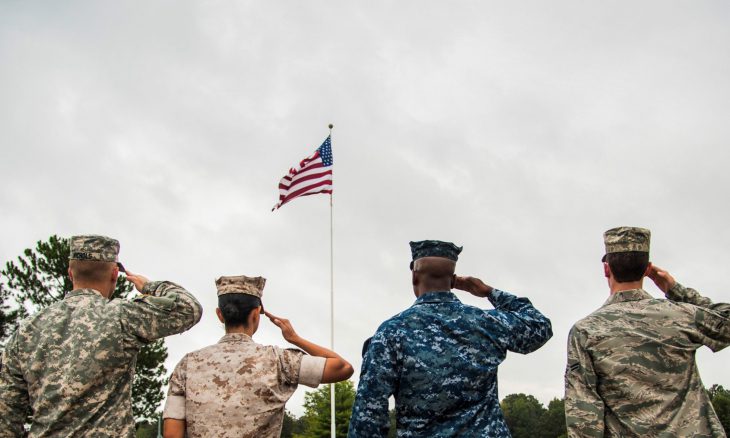This is the second of thirteen issues selected by our members and resulting from a nationwide faith and values study called Vital Signs.
Each week, we will cover a new topic with in-depth insights and biblical perspective in order to encourage, equip, and inspire praying Americans leading up to the 2020 Election.
Protection from those who mean us harm is a Constitutional requirement.
The United States Department of Defense is an executive branch department of the federal government charged with coordinating and supervising all agencies and functions of the government related to national security and the various branches of the United States Armed Forces. It is headquartered out of the Pentagon in Arlington, Virginia, just across the river from Washington, D.C., and is headed by the Secretary of Defense Dr. Mark Esper. The Joint Chiefs of Staff administer the inner workings of the Pentagon. The president is the nation’s and the military’s Commander-in-Chief.
America’s Constitution, even in its Preamble, provides for the nation’s defense. Article One, Section Eight of the Constitution lists 17 separate powers that are granted to the Congress. Six of those powers deal exclusively with the national defense…far more than any other specific area of governance. Article Two establishes the responsibilities of the president and the powers of his office.
Article Four, Section Four of the Constitution states that the “United States shall guarantee to every State a republican form of government that shall protect each of them against invasion.” While states are given broad areas of sovereignty, the national defense is the responsibility of the federal government, and states are prohibited from keeping troops or warships in time of peace or engaging in war, except with the consent of Congress in Article One, Section Ten.
Prevailing notions and attitudes of many in America, i.e., the nation’s world view

Old and some new antagonisms and the ever-present chance of a wider global conflict forces the Pentagon and the president, as Commander-in-Chief, to keep a sharp eye on American readiness. Recognizing actions being taken by other countries, large commercial entities, rogue militias, and terror groups, are a first step in managing risk and avoiding almost certain disaster.
Nations like China, Russia and Iran are seen as the greatest of national security threats to the U.S. as each country has focused on technological developments, including cyber technology. The Defense Department recently underscored sharp differences with several policy discussions and comments that have forced a broader view of the policies of these nations. Each has taken major steps to modernize their military capabilities.
Industry leaders are beginning to take note of the need for cybersecurity and counter-espionage protocols. For China in particular, the approach of their government on emerging technology is to use a whole-of-country method, pressing academia, private industry, and provincial governments to develop and field advanced technologies with military capabilities.

China’s stated goal is set to become the center of the world in technology by 2030, and to establish itself as the world’s leader in cloud computing, e-commerce, semiconductors, hypersonic vehicles and weapons, global quantum-encrypted communications, next-generation broadband wireless, and big data operations, all of which have a military component.
The Department of Homeland Security has identified foreign students and exchange visitors from China, and from other countries, as a security risk through extracurricular espionage activities. But it is not only students. Recently 54 scientists have been fired or reassigned by the National Institutes of Health as a result of an ongoing investigation into theft of biomedical information benefitting foreign governments who were also undisclosed sources of financial support.
It is not only technical information or intellectual property theft that concerns national security officials. In June 2020, Google disclosed that its TAG team discovered hackers from both China and Iran targeting staffers on both the Biden and Trump campaigns, although, they suggested, their efforts were unsuccessful.
Nor is it just China and Iran. For three years, President Trump and his campaign were investigated on charges of colluding with Russia to win the 2016 presidential election. Those reports were found to be false. But the FBI recently reported that it had conducted a decade-long investigation that culminated in the arrests of 10 Russian sleeper agents (who were later swapped for four prisoners held in Russia).
Other developments are witnessed almost daily from nations like North Korea, some in the Persian Gulf area, Afghanistan, and nations in Africa and Eastern Europe.
The rise of the coronavirus has also created national security strategy modifications. A recent Star Forum at the Massachusetts Institute of Technology on “Rethinking National Security in the Age of Pandemics,” pointed to a “swing in the pendulum” that “fundamentally altered the equation” on global security. The panel noted that spending on nuclear weapons by the U.S. exceeds the amount spent on public health, saying there is now a clear imperative for changing budget priorities, and the “21st century definition of national security.”
While there is a need for new thinking on budgeting priorities, international tensions aren’t reduced because of pandemics. Indeed, they may be enhanced as charges of weaponized pathogens erupt.

Defending America has also turned in recent weeks to watching western civilization under attack and the United States’ national history being rewritten. He was perhaps prophetic in January 1989, when President Ronald Reagan gave his farewell address.
“I’m warning of an eradication of the American memory that could result, ultimately, in an erosion of the American spirit. Let’s start with some basics: more attention to American history…”
Recent Pew Research studies revealed strong support for America’s military, a growing concern about cyberattacks and data breaches, and the addition of major threats to the well-being of America’s health as important as the spread of nuclear weapons or terrorism.
Americans also see social media platforms as propaganda battlegrounds, with many feeling that more American public officials should put together a strategy in support of democracy, communicate American values, and inform the world about who America is proudly. At the same time, there are others with just as strong an unfavorable view of America, and a hard anti-Americanism is surging.
Another prominent statesman of the 20th century, Winston Churchill, whose mother was an American, spoke of the “foretaste” of war in Munich in 1938, calling it “a bitter cup which will be proferred to us year by year, unless by a supreme recovery of moral health and natural vigor, we arise again and take our stand for freedom as in the olden time.”
What the Bible has to say:
National defense and military preparedness are Biblical concepts. The book of Deuteronomy deals with war and how it is to be approached.
“And if you faithfully obey the voice of the Lord your God, being careful to do all his commandments that I command you today, the Lord your God will set you high above all the nations of the earth. .. The Lord will cause your enemies who rise against you to be defeated before you. … But if you will not obey the voice of the Lord your God or be careful to do all his commandments and his statutes that I command you today, then all these curses shall come upon you and overtake you. … The Lord will cause you to be defeated before your enemies” (Deuteronomy 28:1, 7, 15, 25).
“For who is God, but the Lord? And who is a rock, except our God? … He trains my hands for war, so that my arms can bend a bow of bronze. You have given me the shield of your salvation, and your gentleness has made me great. You gave a wide place for my steps under me, and my feet did not slip; I pursued my enemies and destroyed them, and did not turn back until they were consumed. … You equipped me with strength for the battle” (2 Samuel 22:32-38).
The Bible provided for a military “draft.”
“From twenty years old and upward, all in Israel who are able to go to war…” were listed in the census taken in the wilderness of Sinai (Numbers 1:3).
God provided for “chaplains” in the form of priests to remind his people that He was always with them (Deuteronomy 20:1-4).
God expected wars to be righteous. In the Old Testament, He had ordered the heathen cities to be destroyed when the Israelites entered the Promised Land (Deuteronomy 20:15-17).
“Whoever sheds the blood of man, by man shall his blood be shed, for God made man in his own image” (Genesis 9:6).
“For he is God’s servant for your good. But if you do wrong, be afraid, for he does not bear the sword in vain. For he is the servant of God, an avenger who carries out God’s wrath on the wrongdoer” (Romans 13:4).
Wars are part of living in a fallen world and will not end as long as there is sin in the Earth.
“And you will hear of wars and rumors of wars. See that you are not alarmed for this must take place, but the end is not yet” (Matthew 24:6).
“Now concerning the times and the seasons, brothers, you have no need to have anything written to you. For you yourselves are fully aware that the day of the Lord will come like a thief in the night. While people are saying, ‘There is peace and security,’ then sudden destruction will come upon them as labor pains come upon a pregnant woman” (1 Thessalonians 5:1-3).
“Why do the nations rage and the people plot in vain? The kings of the earth set themselves, and the rulers take counsel together…Now therefore, O kings, be wise, be warned, O rulers of the earth. Serve the Lord with fear, and rejoice with trembling” (Psalm 2:1-2, 10-11).
Personal preparedness is centered on faith in God’s protection.
“So then let us not sleep, as others do, but let us keep awake and be sober. … Let us be sober, having put on the breastplate of faith and love and for a helmet, the hope of salvation” (1 Thessalonians 5:6, 8).
“Some trust in chariots and some in horses, but we trust in the name of the Lord our God” (Psalm 20:7).
“Therefore encourage one another and build one another up, just as you are doing” (1 Thessalonians 5:11).
YOUR RESPONSE
- Pray that the nation’s leaders do their Constitutional duty to provide for the defense of all Americans.
- Pray for the nation’s leaders to be wise and courageous in standing by true allies.
- Pray for discernment for leaders in Congress and others to see the truth in reports of those who would do harm to the United States, and to be forewarned of impending threats and not caught by surprise.
- Pray for those in the Pentagon to be honorable men and women in their plans and budgets for the defense of America.
- Pray for Christians to be prepared in every circumstance for the present and for the coming return of Jesus Christ.










